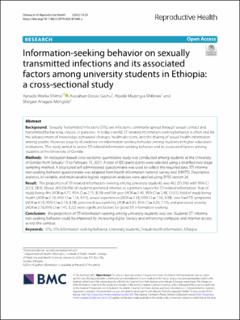| dc.identifier.citation | Shimie, A. W., Gashu, K. D., Shiferaw, A. M. & Mengiste, S. A. (2022). Information-seeking behavior on sexually transmitted infections and its associated factors among university students in Ethiopia: a cross-sectional study. Reproductive Health, 19(1), Artikkel 25. | en_US |
| dc.description.abstract | Background: Sexually Transmitted Infections (STIs) are infections commonly spread through sexual contact and transmitted by bacteria, viruses, or parasites. In today’s world, STI-related information-seeking behavior is often vital for the advancement of knowledge, behavioral changes, health decisions, and the sharing of sexual health information among youths. However, paucity of evidence on information-seeking behavior among students in higher education institutions. This study aimed to assess STI-related information-seeking behavior and its associated factors among students at the University of Gondar.
Methods: An institution-based cross-sectional quantitative study was conducted among students at the University of Gondar from January 15 to February 15, 2021. A total of 832 participants were selected using a stratified two-stage sampling method. A structured self-administered questionnaire was used to collect the required data. STI information-seeking behavior questionnaire was adapted from health information national survey tool (HINTS). Descriptive statistics, bi-variable, and multivariable logistic regression analyses were applied using SPSS version 26.
Result: The proportion of STI related information-seeking among university students was 462 (55.5%) with 95% CI (52.3, 58.9). About 263 (56.9%) of students preferred internet as a primary source for STI related information. Year of study being 4th (AOR = 4.77, 95% CI = 2.75, 8.29) and 5th year (AOR = 5.45, 95% CI = 2.48, 12.01), field of study being health (AOR = 2.19, 95% CI = 1.16, 4.11), sexual experiences (AOR = 2.33, 95% CI = 1.56, 3.48), ever had STI symptoms (AOR = 4.19, 95% CI = 2.14, 8.18), perceived susceptibility (AOR = 5.05, 95% CI = 3.29, 7.75), and perceived severity (AOR = 2.16,95% CI = 1.45, 3.22) were significant factors for good STI information-seeking.
Conclusion: The proportion of STI information-seeking among university students was low. Students' STI information-seeking behavior could be improved by increasing digital literacy and enhancing computer and internet access across the campus. | en_US |

